Boosting Public Discourse: Towards a Targeted, Evidence-Based Strategy to Improve Moral Reasoning

This project explores the impact of unreflective use of key moral terms on public discourse and aims to enhance critical thinking among youth through a reflective understanding of these terms. By mapping the use of key moral terms and developing an online decision-making game in collaboration with young advisors, the project seeks to encourage introspection and improvement in moral reasoning. This initiative not only targets the enhancement of democratic policy-making and societal resilience but also addresses the challenge young people face in forming well-reasoned moral positions. The evaluation of the game in educational settings will provide insights into promoting discourse skills as essential competencies for democratic societies and their role in strengthening societal cohesion.
Involved Researchers
Financed by: SNF
Duration: 2023 - 2026
More Information
The aim of this project is to contribute to a better understanding of how public discourse can fail due to an unreflective use of key moral terms, and to test a strategy for improving critical thinking skills that focuses on a well-reflected use of key moral terms among young people - the emerging next generation of citizens. Empowering citizens, especially the younger generation, to constructively engage in quality public discourse can facilitate the search for the best policies in times of crisis, increase the democratic legitimacy of policies and strengthen the resilience and cohesion of society.
The project will first identify key moral concepts to be included in the study. It will then analyse how key moral concepts are used in public discourse and undertake a philosophical analysis of common conceptual and argumentative problems. In a next step, an online decision-making game will be developed together with young counsellors. The game will encourage participants to reflect on their own understanding of key moral concepts and help them to critically examine and, if necessary, improve their own moral reasoning. The game will be evaluated at several schools.
The project is aimed specifically at young people between the ages of 14 and 19 - an age at which developing coherent, well-reasoned, and as consistent as possible one's own positions on moral issues is an important challenge. The findings from the study will contribute to an improved understanding of how discourse skills can be promoted as a key competence, how public discourse is shaped in democratic societies and whether public discourse can fulfil its potential to contribute to societal resilience.